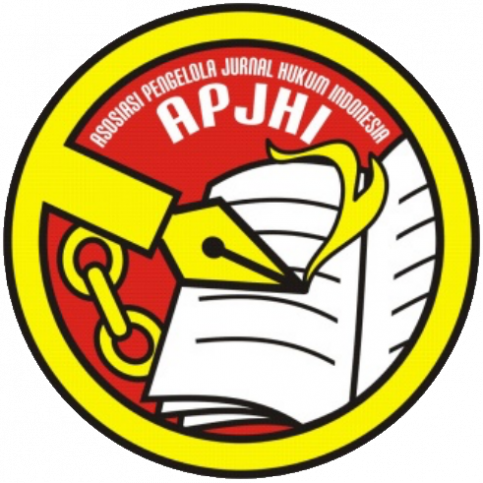DEKOSNTRUKSI EPISTEMOLOGI TIMUR DALAM ILMU PENGETAHUAN HUKUM
Abstract
ABSTRAK
Perkembangan epistemology timur dapat terlihat pada bangunan epistemology dimana dalam bangunan itu nampak Perkembangan yang mutahir spesialnya dalam diskursus epistemologi Ilmu yang dipelopori oleh‘ Abid al- Jabiri, yakni; epistemologi bayÄni,‘ irfÄni, dan burhÄni. BayÄni ialah wujud epistemologi yang menekankan dominasi pustaka ( nash) dengan metode langsung atau tidak langsung, dan dijustifikasi lewat ide kebahasaan yang digali lewat inferensi( isti’ lal), dan dengan Mengambil pendekatan kualitatif dekonstruktif hermenuitis berarti lebih fokus pada proses dan makna yang tidak diselidiki secara detail atau yang dinilai secara kualitatif. Dimana kekuatan konteks yang membentuk studi dalam penyusunan jurnal ini sehingga dekonstruksi memberi arti penting bagi teks-teks yang terpinggirkan dari pusat kajian umum hukum. Hal ini terutama ketika menyelidiki konsep metode pemikiran hukum yang berpusat pada pemikiran barat menuju ke-timur sehingga dapat diambil konkulsi bahwa pendekatan epistem itu memiliki kerangka pengetahuan ilmu hukum dalam metode epistemologis yang memiliki khasanah pemikiran timur yang dapat dicermati pada  tidak terbatas hanya dalam keterangan hukum islam saja, namun dalam epistemologi ilmu hukum berbasis kerangka transendental dalam pondasi epistemologisnya ilmu hukum bisa dipahami dengan pendekatan holistik yang menyadingkan antara logika dan rasa.
ABSTRACT
The epistemology building, where you can observe the most recent advancements, is where you can see the evolution of eastern epistemology. This building contains the bayani, 'irfani, and burhani schools of thought, which were pioneered by 'Abid al-Jabriri. With a qualitative deconstructive hermeneutic approach, which means putting more emphasis on processes and meanings that do not lose spirituality, Bayani is embodying an epistemology that suppresses the dominance of literature (nass) by direct or indirect methods and is justified through linguistic ideas explored through inference (isti'lal). detail or not quantitatively measured. The preparation of this journal took into account socially constructed realities, the subjectivity of the researcher and the subjects under study, and the influence of the context on the studies so that deconstruction gives weight to voices or texts that are marginalized from the center of general studies. This is particularly true when discussing the idea of the legal thought process, which is a thinker who moves between western and eastern thought, in order to draw the conclusion that the epistemological approach permits the creation of a new song that can fit into the framework of several sciences that are similar to legal science. In comparison to religion, the evolution of legal science in the east may be investigated more thoroughly, and it can be discussed in relation to concerns of scientific, social, customary, economic, and legal growth.
Keywords
Full Text:
PDF (Bahasa Indonesia)References
Abdullah, M. A. (2006). Islamic Studies di Perguruan Tinggi. Pustaka Pelajar.
Al-Walid, K. (2005). Tasawuf Mulla Sadra. Muthahhari Press.
Bagir, H. (2005). Integrasi Ilmu Sebuah Rekontruksi Holistik. Arasi Mizan.
Darmiyati Zuchdi, E. D., & Afifah, W. (2021). Analisis Konten Etnografi & Grounded Theory, dan Hermeneutika Dalam Penelitian. Bumi Aksara.
Hamdi, A. Z. (2004). Tujuh Filsuf Muslim. Pustaka Pesantren.
Hartoko, D. (1995). Kamus Populer Filsafat. Raja Grafindo Persada.
Haryono, C. G. (2020). Ragam Metode Penelitian Kualitatif Komunikasi. CV. Jejak.
Jabiri, M. A. al. (2009). Bunyah al-‘Aql al-‘ArabÄ«: DirÄsah TahlÄ«liyah Naqdiyyah li Nuzhum al-Ma’rifah fÄ« TsaqÄfah al-‘Arabiyyah. Markaz DirÄsÄt Al-Wahidah Al-‘Arabiyyah.
Kadir, M. A. (2003). Ilmu Islam Terapan. Pustaka Pelajar.
Mufid, F. (2013). Perkembangan Paradigma Epistemologi dalam Filsafat Islam. Ulumuna:Jurnal Studi Keislaman, 17(1), 19–42.
Muhammad, S., Ximei, K., Sharif, I., & Haq, Z. ul. (2020). An Overview of Women Entrepreneurship from Islamic Perspective. Review of Economics and Development Studies, 6(4), 857–866. https://doi.org/10.47067/reads.v6i4.285
Muslih, M. (2015). Filsafat Ilmu; Kajian atas Asumsi Dasar, Paradigma, dan Kerangka Teori Ilmu Pengetahuan. LESFI.
Sadra, M. (1984). MafÄtih al-Gayb. Academy of Philosophy.
Sharif, M. . (1963). A History of Muslim Philosophy. Otto Harrassowitz.
Sudarminta, J. (2002). Epistemologi Dasar: Pengantar Filsafat Pengetahuan. Kanisius.
Thohari, A. (2013). Epistemologi Fikih Lingkungan: Revitalisasi Konsep Masalahah. Az Zarqa’: Jurnal Hukum Bisnis Islam, 5(2), 145–161. http://ejournal.uin-suka.ac.id/syariah/azzarqa/article/view/1317
Wahyudi, I. (2007). Pengantar Epistemologi. Badan Penerbitan Filsafat UGM.
Yazdi, M. H. (1995). Ilmu Hudhuri; Prinsip-Prinsip Epistimologi dalam Filsafat Islam. Jurnal Filsafat.
DOI: https://doi.org/10.35194/jj.v3i1.2874
Refbacks
- There are currently no refbacks.
Copyright (c) 2023 Journal Justiciabelen (JJ)

This work is licensed under a Creative Commons Attribution-ShareAlike 4.0 International License.
JOURNAL JUSTICIABELEN (JJ) INDEXED BY:

This work is licensed under a Creative Commons Attribution-ShareAlike 4.0 International License.
Postgraduate Study Program Master of Law, Suryakancana University, Jl. Pasir Gede Raya-Cianjur, 43216, Tel. 0263-270106, Fax. 0263-261383, Email: journal.justiciabelen@unsur.ac.id





1.png)













